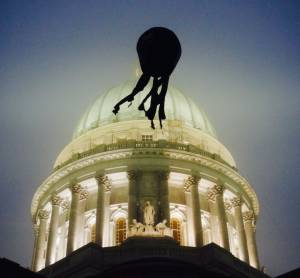By Janette Rosenbaum, 350 Madison

In November 2018, Wisconsinites will vote for a governor. This post is the first in a series on the environmental views of the candidates. This series is for information only. 350 Madison does not officially support any candidate.
What are the most important issues that you would take on if you were elected governor?
“The first priority for me is the environment,” said Democratic candidate Jeff Rumbaugh. Noting that “environment” is a broad term, he specified that “the greatest concern right now for Wisconsinites, and perhaps across the planet, is fresh water.”
Many people are unaware that the Great Lakes are the largest body of fresh water on the planet, Rumbaugh explained. “They need to be respected and treated properly,” he said, noting that this applied to the inland waters of Wisconsin as well.
Asked about threats to fresh water in Wisconsin, Rumbaugh named Foxconn and the city of Waukesha, both of which plan to extract water from Lake Michigan, use it, treat it, and return it to the lake. Scott Walker was the first governor to okay Waukesha’s request to take water from the Great Lakes, “and I would be the last governor to do that,” declared Rumbaugh. He pointed out that as the leaders of the states and provinces surrounding the Great Lakes work together to manage this crucial water resource, a single veto can stop plans from moving forward.
Where would you rate climate change on your priority list?
“It goes hand in hand” with the issue of fresh water, Rumbaugh said, before naming a variety of strategies he would implement as governor to combat climate change, beginning with “I am against fracking.” Asked to clarify (since Wisconsin does not have the kind of natural resources that allow for fracking), Rumbaugh said, “The frack sand mining is what I’m talking about.” He explained that “it’s unregulated; it’s too prominent in certain areas,” naming the town of Arcadia as an example. Many groups, including dairy farmers and Native Americans, would favor an end to frack sand mining in Wisconsin, Rumbaugh thought. “I don’t think I would find a lot of challenge outside the corporate venue.”
Back on the general topic of climate change, Rumbaugh said, “I am also interested in taxing industrial polluters in Wisconsin.” The money raised from such a tax would be used to rebuild Wisconsin’s Department of Natural Resources, which in turn would force businesses to adopt environmental best practices. Rumbaugh also said that he would reinstate the mining moratorium and move Wisconsin away from coal and fossil fuel dependence.
Asked how he would phase out fossil fuels in the state, Rumbaugh said that “we need to rely more on green energies” and invest in technologies for storing energy. “Right now and in the future,” Rumbaugh explained, “our wind turbines and solar panels should be proliferated and advanced as we move forward.” If we also build out infrastructure to store energy, we can compensate for the shortcomings of renewable energy – mainly, that it isn’t produced when the wind isn’t blowing and when the sun is blocked by clouds.
How to store energy? “I in part propose that we begin proliferating electric vehicles in Wisconsin. I feel that with enough electric vehicles – it’s not going to have an effect if we’re only talking about 100,000 or something – but moving forward, each vehicle is essentially a large battery, and charging the vehicles from the grid is storing energy.”
And how are we going to get more electric vehicles in Wisconsin? Rumbaugh proposed that the cars of the future should be built in our state and sold directly to consumers. He also envisions an incentive program to encourage owners of low-fuel-efficiency cars to trade in for more environmentally-friendly vehicles.
On the topic of transportation, Rumbaugh also talked about tying in the repair of our roadways to the increase in electric vehicles, adding more charging stations, and using warm-mix asphalt instead of the hot-mix variety. This alternative type of asphalt reduces paving costs, extends the paving season, improves compaction, can be hauled longer distances, provides better working conditions – such as lower emissions of fumes and odors – and doesn’t absorb as much heat.
Do you know what Line 61 is?
Rumbaugh passed 350 Madison’s pop quiz, explaining that Line 61 is an oil pipeline that would “make Keystone XL look small,” and that most people haven’t heard of it. He added that he supported President Obama’s decision to block construction of the Keystone XL pipeline. In reference to the Dakota Access pipeline, he said that if he had been governor over the last year, he would have sent Wisconsin’s state troopers to help California clean up and rebuild from the wildfires and mudslides, not to North Dakota to protect industry interests.
“I don’t think that pipelines are safe,” Rumbaugh concluded. “I think there’s been enough evidence to prove that the dangers outweigh the perks, if you will.”
Anything else?
Before wrapping up the interview, Rumbaugh talked about “the retail shopping apocalypse” – the steady increase in the popularity of online shopping, and the corresponding decline of shopping malls. “I propose that [the supermalls] be converted,” Rumbaugh said. “And I’m not interested in forcing anyone to lose their job, or kicking out retailers…” The businesses won’t be profitable any longer and the jobs will go elsewhere anyway, he explained.
Once that happens, Rumbaugh envisions turning these developed, utility-connected areas into “energy centers”. The buildings could be covered in solar panels or house transformers, to generate or store energy. “We don’t have to go tearing up more land with this kind of use,” Rumbaugh said.
As of May 2018, Rumbaugh has withdrawn his candidacy for governor of Wisconsin.
